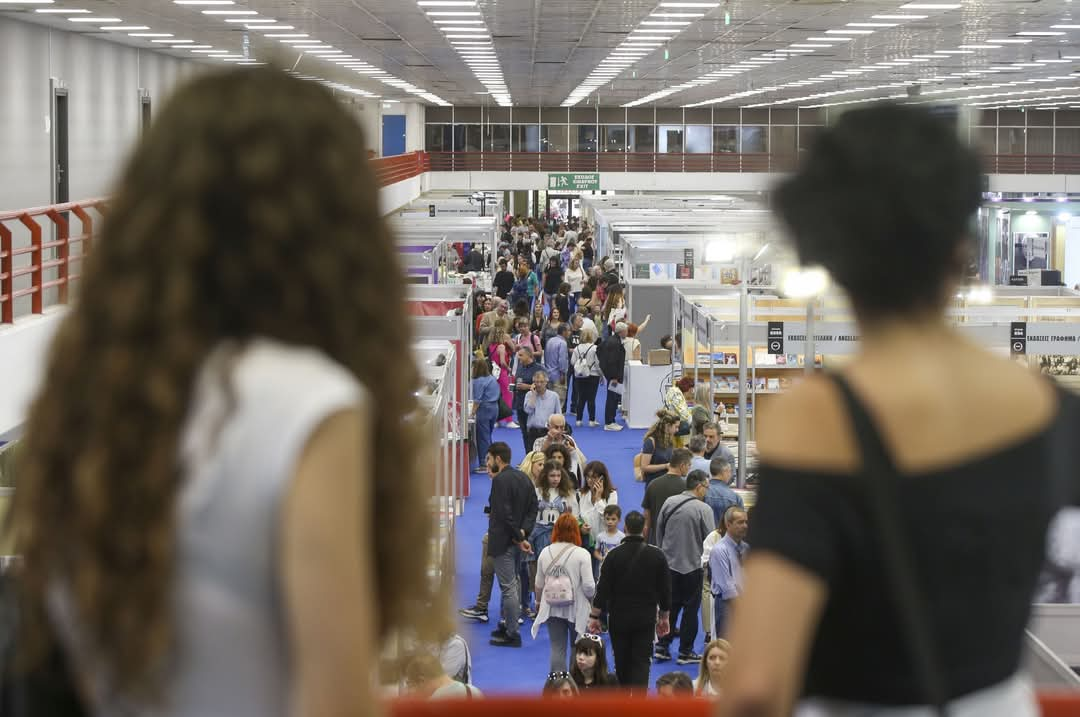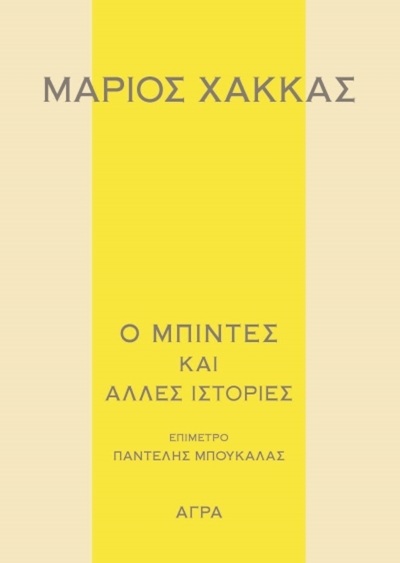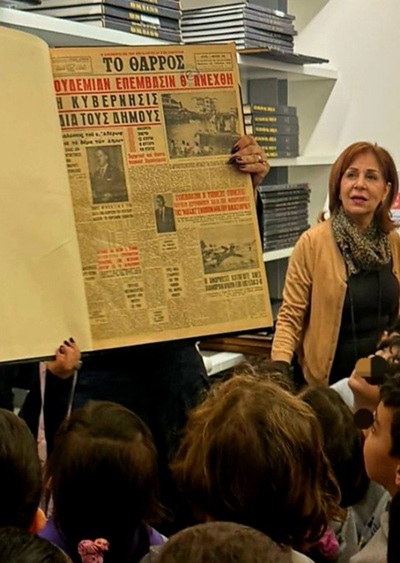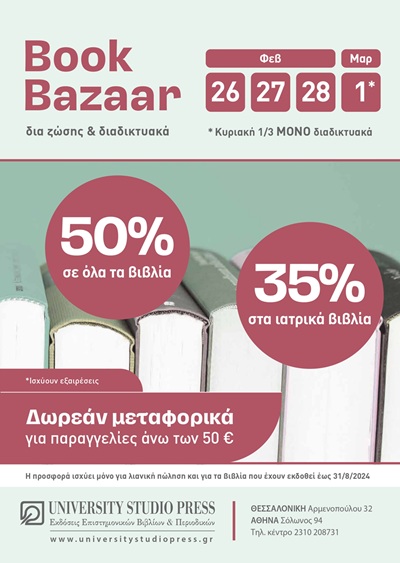
The main theme of this year’s TIΒF is Human Creativity and Artificial Intelligence: man and machine, challenge and opportunity, risk and possibility. There are many events, discussions and actions by the Hellenic Foundation for Books and Culture, publishers and major institutions in the country that attempt to explore this, for most people still uncharted, “wondrous new world”.
Institutional Events:
On Friday 9 May, the Hellenic Authors’ Society is organising a discussion entitled The Book in the Age of Artificial Intelligence, exploring the field of publishing, marketing and book content. Will reader reception and authorial conception change? What will the human role in general be in the future? What forms will the impact of AI take? Speakers: Yannis Baskozos, journalist; Panagiotis Kapos, researcher of Communication, Media and Culture and vice-president of HFBC; Michael Kalamaras, digital publishing consultant; Kostas Katsoularis, secretary of the Board of Directors of OSDEL.
The National Library of Greece organizes a highly topical panel on culture in the age of algorithms and oligarchies: What will be the fate of human creation and creativity in the age of artificial intelligence? How much is freedom of thought and expression threatened by the alliance of political and technological oligarchies? What is the future of work? What is Europe’s role and potential in this new political and technological environment? Speakers: Nikolas Sevastakis, writer, professor at the Aristotle University of Thessaloniki; Yannis Balabanidis, political analyst – writer; Stavros Zoumboulakis, president of the Electoral Council of the NLG.
Discussions on ebook and book and reading in the digital condition are developing alongside those on AI:
On Thursday 8 May, ERT3 is organising a debate entitled The “smart” book. “Reading” in the algorithm, while on Friday 9 May the Goethe Institute of Thessaloniki in cooperation with the Department of German Language and Literature of the University of Thessaloniki present the book by Gerhard Lauer, The pleasure of reading – in another way. Literature in the digital condition. Dr. Gerhard Lauer, Professor of Book Science at the Johannes Gutenberg University Mainz, focuses his research on the history of the book and the experimental promotion of reading. At the event he talks about the importance of literature in an increasingly digital society, together with Michael Kalamaras, publishing consultant and digital media expert. Dr. Elke Sturm-Trigonakis, Professor of Comparative Literature at the Department of German Language and Literature of the Aristotle University of Thessaloniki, moderates.
The Readers Next digital literacy initiative is organising a debate entitled Pages and pixels: the future of reading. What do we lose and gain with digital reading? The feel of paper: sentimental nostalgia or irreplaceable experience? The younger generation of readers: books and/or screens? How are libraries and publishers evolving in this hybrid landscape? We explore how digital technology has transformed the way we read – from traditional books to mobile screens and examine the differences between paper and digital reading, the impact on comprehension, attention and memory, and the preferences of today’s readers. Speakers: Kostis Demolios, co-founder of the “Spitodendendro” nursery and creator of Media Owl, Anthi Baliou, librarian at Pan. Katerina Chrysanthopoulou, PhD in Media Education and Digital Literacy, University of Thessaloniki, lecturer at the Ionian University. The moderator is Sofia Papadopoulou, journalist, journalist of the Athens University of Technology and Media.
On the same day, the Association of Greek Librarians and Information Scientists (EEBEP) in collaboration with the International Hellenic University presents the conclusions of the survey “E-books and libraries in Greece”: Exploring the field, which documents the Greek market for ebooks, their current position in Greek libraries and the attitudes of library managers and users and publishers towards ebooks and their lending. Nikos Panagiotopoulos, EEBEP-publisher representative, speaks, moderated by Michalis Kalamaras, publishing consultant.
On Saturday 10 May, the EEBEP and the International University are organising a discussion entitled AI in Education and Culture: opportunities, challenges and transformation. AI is redefining how educational institutions, libraries and museums manage, share and exploit knowledge and cultural heritage. Distinguished academics, cultural practitioners and AI experts will discuss the new opportunities that are emerging, from personalisation of learning and automation of processes to digitisation and interpretation of cultural artefacts, the challenges that need to be addressed and the ethical dimensions of using technology in educational and cultural environments.
AI also inspires artistic creation: The National Theatre of Northern Greece presents at noon on Saturday at the Poetry Box the performance Oraculum Ex Machina: Digital Prophecies. Idea & Direction: Christos Papadimitriou, Dramaturgy: chat gpt, Choreography: Kostas Gerardos, Music composition -Vocals: Chryssa Lazarioti.
From e-learning to Artificial Intelligence: Ecologies of school literacy and the future of the Greek school, is the title of the talk organized by the Centre for the Greek Language on Sunday 11 May. The lecture will use research data from the period of tele-education and from the efforts to use AI in education, in order to reflect the current ecologies of school literacy and to formulate proposals for necessary changes in the Greek school. Speakers: Dimitrios Koutsogiannis, Professor Emeritus of Linguistics, Aristotle University of Thessaloniki, Deputy President of the Centre for Greek Language. Coordination-Commentary: Eleftheria Zagka,school counsellor for philology, Anastasios Matos, school counsellor for philology.

Translation Festival:
As part of the 9th TIBF Translation Festival, the Panhellenic Translators’ Association is organising two exciting, interactive events on Saturday morning at the Poetry Box under the general title Cui Bono? A critical evaluation of the use of AI in literary translation:
In the first part of The act of translation under the microscope, translators compare a human and a mechanical rendering of literary passages. The nuances, errors and approaches are highlighted through dialogue with the audience. Translators Emilia Diamantopoulou, Maria Sgourou and Michaela Corvino speak. In the second part Beyond translation: thinking, values and responsibility, the ethical and political dilemmas of AI in literary translation are discussed. How is quality defined when the discourse is creative? What are the limits of technology when managing cultural content? What is lost and what is at stake when humans are replaced by algorithms? Translators Emilia Diamantopoulou and Vassilis Babouris speak.
Publishers’ Events:
On Thursday, May 8, Stamoulis Publications, on the occasion of the book Screen vs Brain, will organize a discussion on the use of screens and the effects on children and young people with the speakers Christos Tsironis and Petros Panagiotopoulos, professors of Theology at the Aristotle University of Thessaloniki and Dr. Yolanda Siskou.
On Friday 9 May, Athens Bookstore Publications is organizing a panel entitled Artificial Intelligence in the book market: Challenges, Problems and Perspective. Moderator: Dimitris Papastergiou, Minister of Digital Governance, Iasonas Fotilas, Deputy Minister of Culture, Panagiotis Doudonis, Member of Parliament, author, Oraeozili Koutsoupia, lawyer, Argyris Kastaniotis, publisher, member of the HFBC Board.
Topos Publications presents the book by Katerina Chrysanthopoulou Documents in a digital world: Education in Media and Information. Today educated people are considered functionally illiterate if they struggle with digital technologies. Is school equipping us for the brave new digital world? How do we assess the rampant information on the internet? What are digital literacies and how do we acquire them? Why do we need training to read the news? Do we learn better from the screen or the paper? Speakers: Christos Fragonikolopoulos, dean at the School of Economics and Political Sciences of the Aristotle University of Thessaloniki, Nikos Panagiotou, professor of the Department of Journalism and Media of the Aristotle University of Thessaloniki, and the author of the book. Moderated by: Anthi Baliou, librarian, University of Macedonia
On Saturday 10 May, Dioptra Publications will present the volume From globalization to artificial intelligence: Greek Literature in the 21st Century. Moderator:Dimitris Tziovas, editor of the volume, Emeritus Professor of Modern Greek Studies, University of Birmingham. Speakers: Makis Karagiannis, writer-critic, Sophia Iakovidou, Associate Professor of Modern Greek Literature at the Aristotle University of Thessaloniki, Maria Akritidou, PhD candidate in Modern Greek Literature at the Aristotle University of Thessaloniki, Panagiotis Lygouris, PhD candidate in Modern Greek Literature at the Aristotle University of Thessaloniki, Panagiotis Kapos, researcher in Communication, Media and Culture, Vice President of HFBC.
On the same day, Athens Bookstore Publications is organizing a discussion entitled Artificial Intelligence: Propaganda, Fake News, Intellectual Rights and the Protection Framework. Institutional representatives of Communication, politicians and communication personalities discuss the new age of communication, propaganda, fake news, deep fake and the protection framework.
Speakers: Maria Antoniadou, President of Journalist’s Union of the Daily Athens Newspapers, Sotiris Triantafyllou, President of Poesy, Pavlos Marinakis, Deputy Minister to the Prime Minister, Nikos Panagiotou, Professor of the Department of Journalism and Media of the Aristotle University of Thessaloniki.
On Sunday 11 May Gerasimos Kouzelis, Professor Emeritus of Social Theory and Sociology at the University of Athens, will speak on the occasion of the book I am not a robot, organised by Themelio Publications. AI models are trained with tons of data and produce results strikingly similar to human activities. But are they capable of generating thoughts, writing stories, feeling? AI is capable of writing beautiful literary stories, but do humans have nothing to fear from it because they know that every word they create comes from a personal universe unlike any other? This book is an experiment with nine human stories and five created by AI. The reader is invited to answer the question: will writers and poets be redundant from now on?
On the same day, Thraka Publications presents the collection of short stories by Yannis Farsaris, Small Algohistories. Each story is the fruit of a dialogue between human inspiration and computational thinking, emphatically posing the question of the new era: Is it possible for a machine, a piece of software, to narrate, to imagine, to move and ultimately to compose something that can be considered literature? Speakers: Yannis Farsaris, writer, Thanos Gagos, poet, editor.
Η Τεχνητή Νοημοσύνη δίνει τον τόνο και στο Επαγγελματικό πρόγραμμα της ΔΕΒΘ:
The keynote on Friday 9 May features a very special guest, Nadim Sadek, who will talk about the transformative impact of AI on the book industry. Sadek is the founder and CEO of Shimmr AI, a company that creates and develops self-optimization campaigns to sell books. The company uses proprietary systems to analyze titles for their psychological and structural data – called BookDNA – supporting low-cost, high-impact advertising campaigns that drive awareness and sales of books with targeted audiences. Shimmr’s campaigns are based on a combination of artificial intelligence, psychology, advertising technology and software engineering.
AI is also the focus of the panel on Saturday 10 May entitled Who is afraid of AI? This is a frank discussion with an eye to the future, full of practical insights, real-life cases and strategic advice. AI is already reshaping the publishing industry. From content creation to the ability to locate books, it is unlocking new tools, raising new concerns and challenging the very essence of creative work. But is it a threat or an opportunity? Speaking are Nadim Sadek, Founder & CEO of Shimmr AI, Prashant Pathak, Head of English Publishing Development (Giunti Editore) and Argyris Kastaniotis, Publisher (Kastaniotis Publications) moderated by Carlo Carrenho, Publishing Consultant (Alpine Global Collective).







Leave A Comment